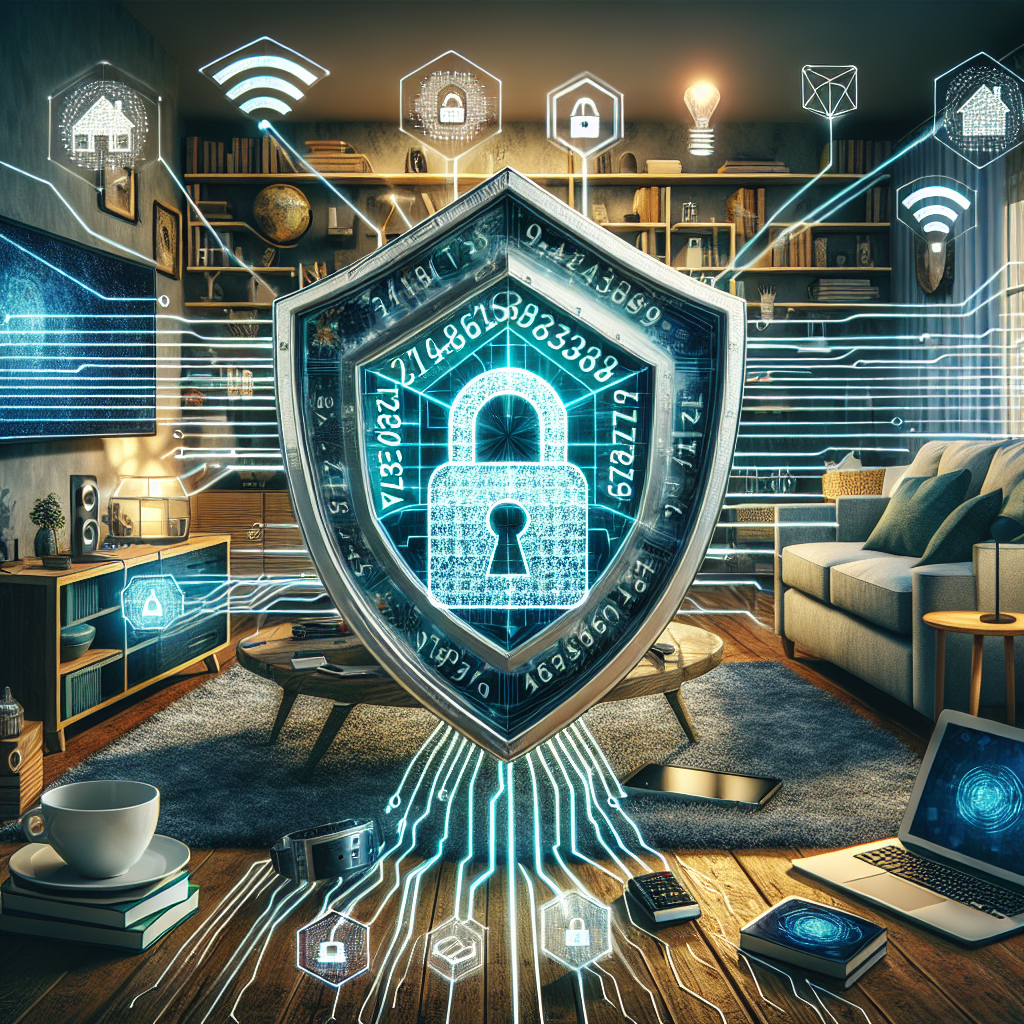In this digital age where an increasing number of devices are connected to our home networks, securing our network with strong passwords is absolutely imperative. Weak passwords are akin to leaving the front door of your home wide open to potential attackers and hackers. By creating complex and unique passwords for our routers, smart devices, and other connected gadgets, we can significantly minimize the risk of unauthorized access and protect our personal information and privacy. This article delves into the importance of securing your home network with strong passwords and provides practical tips and strategies to enhance the security of your digital domain.
Importance of Strong Passwords for Home Network Security

– Weak passwords make home networks vulnerable to cyberattacks
In today’s digital age, where cyber threats are constantly evolving, the use of weak passwords poses a significant risk to the security of home networks. Cybercriminals often employ sophisticated techniques to crack weak passwords, gaining unauthorized access to sensitive information and devices connected to the network.
- Strong passwords act as the first line of defense against unauthorized access
Strong passwords play a crucial role in safeguarding home network security by acting as the initial barrier against unauthorized intrusions. By creating complex passwords that combine a mix of uppercase and lowercase letters, numbers, and special characters, homeowners can significantly enhance the resilience of their network against potential cyber threats.
Common Misconceptions about Password Strength
- Length vs. complexity: debunking myths about password requirements
When it comes to password strength, many individuals believe that complexity, such as including a mix of uppercase and lowercase letters, numbers, and special characters, is the most crucial factor. However, recent research has shown that password length is actually a more significant determinant of security. Longer passwords are inherently more secure as they provide a larger number of possible combinations, making them harder for hackers to crack using brute force attacks. Therefore, a passphrase comprising of several words can be more secure than a shorter password with a combination of different characters.
- Reusing passwords across multiple accounts: the risks and consequences
Another prevalent misconception is the belief that using the same password for multiple accounts is a convenient practice. However, this practice significantly increases the vulnerability of all linked accounts. If a hacker manages to obtain a password from one account, they can easily access other accounts that share the same password. This domino effect can lead to severe consequences, including identity theft, financial loss, and privacy breaches. Therefore, it is essential to use unique passwords for each online account to minimize the risk of a security breach.

Creating Strong Passwords for Home Networks
- Utilizing a mix of uppercase, lowercase, numbers, and symbols
Crafting a strong password for your home network involves incorporating a diverse range of characters to enhance its complexity. By interweaving uppercase letters, lowercase letters, numbers, and symbols, you create a multi-layered defense against potential intruders. This amalgamation of character types significantly increases the difficulty of cracking the password through brute force or dictionary attacks.
- Avoiding easily guessable information like birthdays or pet names
When devising a password for your home network, it is imperative to steer clear of predictable and easily guessable information such as birthdays or pet names. Hackers often exploit personal details to crack passwords, making it crucial to opt for non-personal, random combinations that are challenging to decipher. By eschewing common patterns and opting for unique sequences, you fortify the security of your home network against unauthorized access.
Implementing Password Managers for Enhanced Security
- Benefits of password managers in generating and storing complex passwords securely
Password managers are highly beneficial tools for enhancing the security of home networks by generating and storing complex passwords securely. These tools use advanced algorithms to create strong, unique passwords for each online account, reducing the risk of unauthorized access. By storing passwords in an encrypted vault, password managers protect sensitive information from cyber threats such as brute force attacks and phishing scams. Additionally, password managers can automatically fill in login credentials, saving time and minimizing the chances of human error in password management.
- How password managers simplify the process of managing multiple passwords

One of the key advantages of password managers is their ability to simplify the process of managing multiple passwords. With the increasing number of online accounts that individuals use on a daily basis, remembering unique passwords for each account can be challenging. Password managers alleviate this burden by securely storing all passwords in one centralized location. This eliminates the need for users to memorize multiple complex passwords, making it easier to access accounts while maintaining a high level of security. Furthermore, password managers often offer features such as password sharing and synchronization across devices, ensuring seamless password management across various platforms.
Best Practices for Securing Home Network Devices
In today’s digital age, securing home network devices is of utmost importance to protect against cyber threats and unauthorized access. Implementing strong password practices is a crucial step in fortifying the security of your network. Below are some best practices for securing home network devices:
- Changing Default Passwords on Routers, Smart Devices, and IoT Gadgets
One common mistake that many homeowners make is neglecting to change the default passwords on their routers, smart devices, and Internet of Things (IoT) gadgets. Default passwords are often easy to guess or widely known, making them vulnerable to hacking attempts. It is imperative to change these passwords to unique, complex combinations that include a mix of letters, numbers, and special characters. Regularly updating these passwords adds an extra layer of security to your network and minimizes the risk of unauthorized access.
- Enabling Two-Factor Authentication for an Added Layer of Security
Two-factor authentication (2FA) is a security feature that requires users to provide two different forms of identification before gaining access to their accounts or devices. By enabling 2FA on your home network devices, you create an additional barrier that enhances the overall security of your network. In addition to entering a password, users may be required to input a verification code sent to their mobile device or authenticate their identity through biometric means. This extra step significantly reduces the likelihood of unauthorized access, even if a hacker manages to obtain your password.
By following these best practices for securing home network devices, you can significantly reduce the risk of cyber threats and safeguard your personal information from malicious actors. Taking proactive measures to strengthen your network security is essential in today’s interconnected world where digital privacy is paramount.
Educating Family Members on Password Hygiene
In the realm of securing home network devices, one of the crucial aspects is educating family members on password hygiene. This proactive step can significantly enhance the overall security posture of the household network.
Importance of sharing passwords securely within the household
- Emphasize the importance of not sharing passwords with outsiders and restricting access to family members only.
- Encourage the use of password managers to securely store and share passwords among family members.
- Highlight the risks associated with sharing passwords through insecure channels like messaging apps or writing them down on paper.
Teaching family members about the risks of weak passwords and how to create strong ones
- Explain the potential consequences of weak passwords, such as unauthorized access to sensitive information or devices.
- Provide guidance on creating strong passwords by incorporating a mix of uppercase and lowercase letters, numbers, and special characters.
- Suggest using passphrases that are easy to remember but hard for others to guess.
- Encourage regular password updates and avoiding the reuse of passwords across multiple accounts to mitigate the impact of a potential breach.
Regular Password Maintenance and Updates
Effective home network security begins with regular password maintenance and updates to prevent unauthorized access and ensure data protection.
-
Setting reminders to change passwords periodically: One crucial aspect of securing a home network is regularly changing passwords to reduce the risk of potential breaches. By setting reminders to update passwords every few months, users can stay ahead of cyber threats and maintain a strong defense mechanism against malicious actors. It is advisable to create complex passwords that include a combination of letters, numbers, and special characters to enhance security levels.
-
Updating firmware and security software on network devices for enhanced protection: In addition to changing passwords, updating firmware and security software on all network devices is essential for maintaining a secure home network. Manufacturers often release patches and updates to address vulnerabilities and improve system defenses. By regularly checking for and installing these updates, users can ensure that their devices are equipped with the latest security features to prevent potential cyber attacks.
Conducting Security Audits on Home Network
Regular Password Maintenance and Updates
In order to ensure the security of a home network, conducting regular security audits is essential to identify and address any potential vulnerabilities. This process involves utilizing online tools to check the strength of current passwords and assessing the overall setup of the home network.
-
Using online tools to check the strength of current passwords: Online tools such as password strength checkers can analyze the complexity and security level of passwords used within the home network. These tools assess factors like password length, inclusion of special characters, and avoidance of common phrases or sequences.
-
Identifying and addressing any vulnerabilities in the home network setup: Security audits also involve examining the overall configuration of the home network, including router settings, firewall protection, and connected devices. By identifying any weak points or outdated security measures, homeowners can take steps to strengthen their network security and prevent unauthorized access.
FAQs: Securing Home Network with Strong Passwords
What is the importance of securing my home network with strong passwords?
Securing your home network with strong passwords is crucial in order to prevent unauthorized access to your personal information and sensitive data. By using strong and unique passwords, you can greatly reduce the risk of hackers gaining access to your network and compromising your privacy and security.
What constitutes a strong password?
A strong password is one that is at least 8 characters long and includes a mix of upper and lower case letters, numbers, and symbols. It is important to avoid using easily guessable information such as birth dates, names, or common phrases. Additionally, it is recommended to use a different password for each of your accounts to further enhance security.
How often should I change my home network password?
It is recommended to change your home network password at least every 3-6 months to minimize the risk of unauthorized access. Regularly updating your password can help to mitigate security threats and ensure that your network remains protected.
Should I enable two-factor authentication for my home network?
Enabling two-factor authentication is an additional layer of security that can greatly enhance the protection of your home network. By requiring a second form of verification in addition to your password, such as a code sent to your mobile device, you can further safeguard against unauthorized access and potential security breaches.